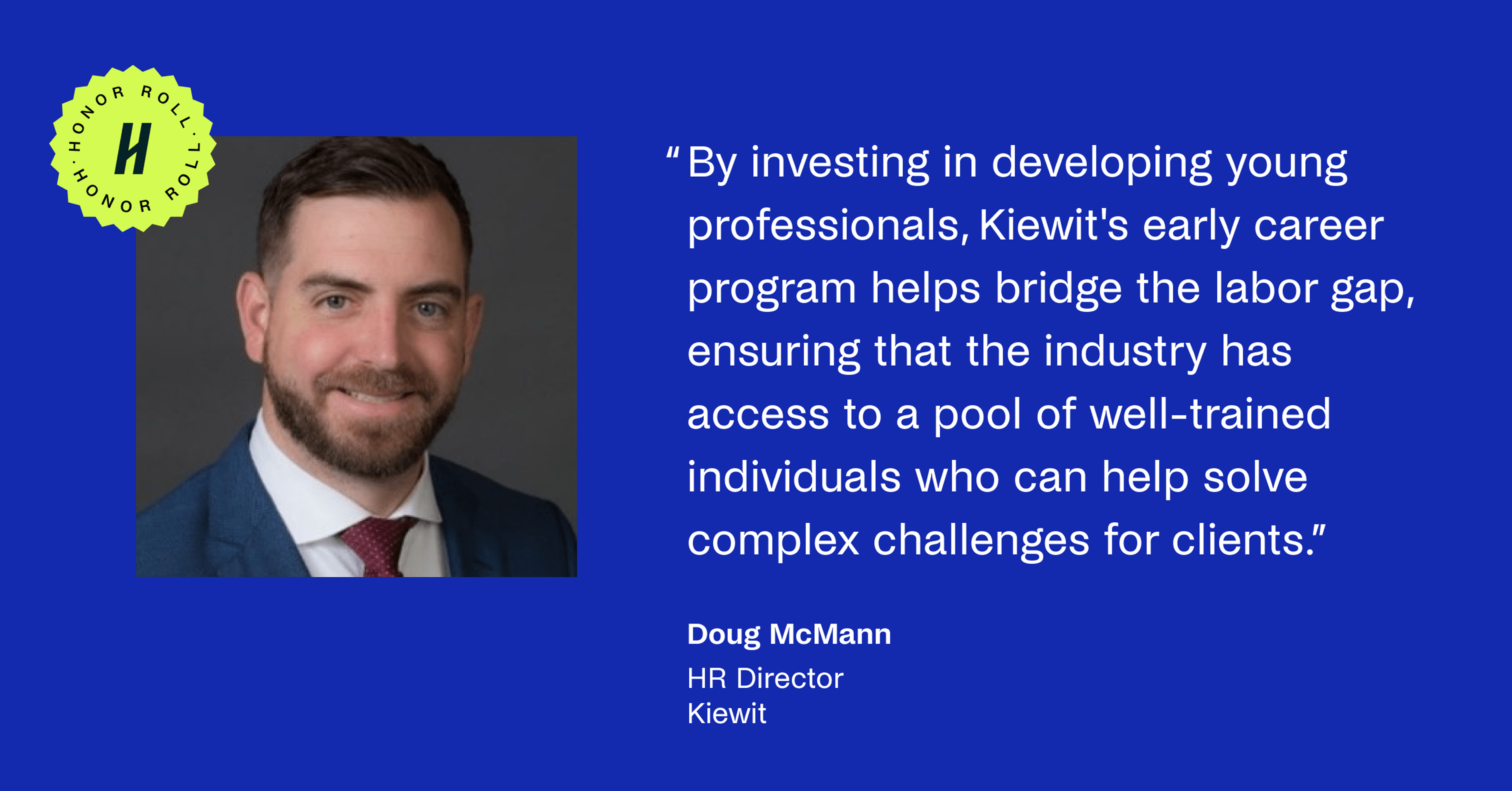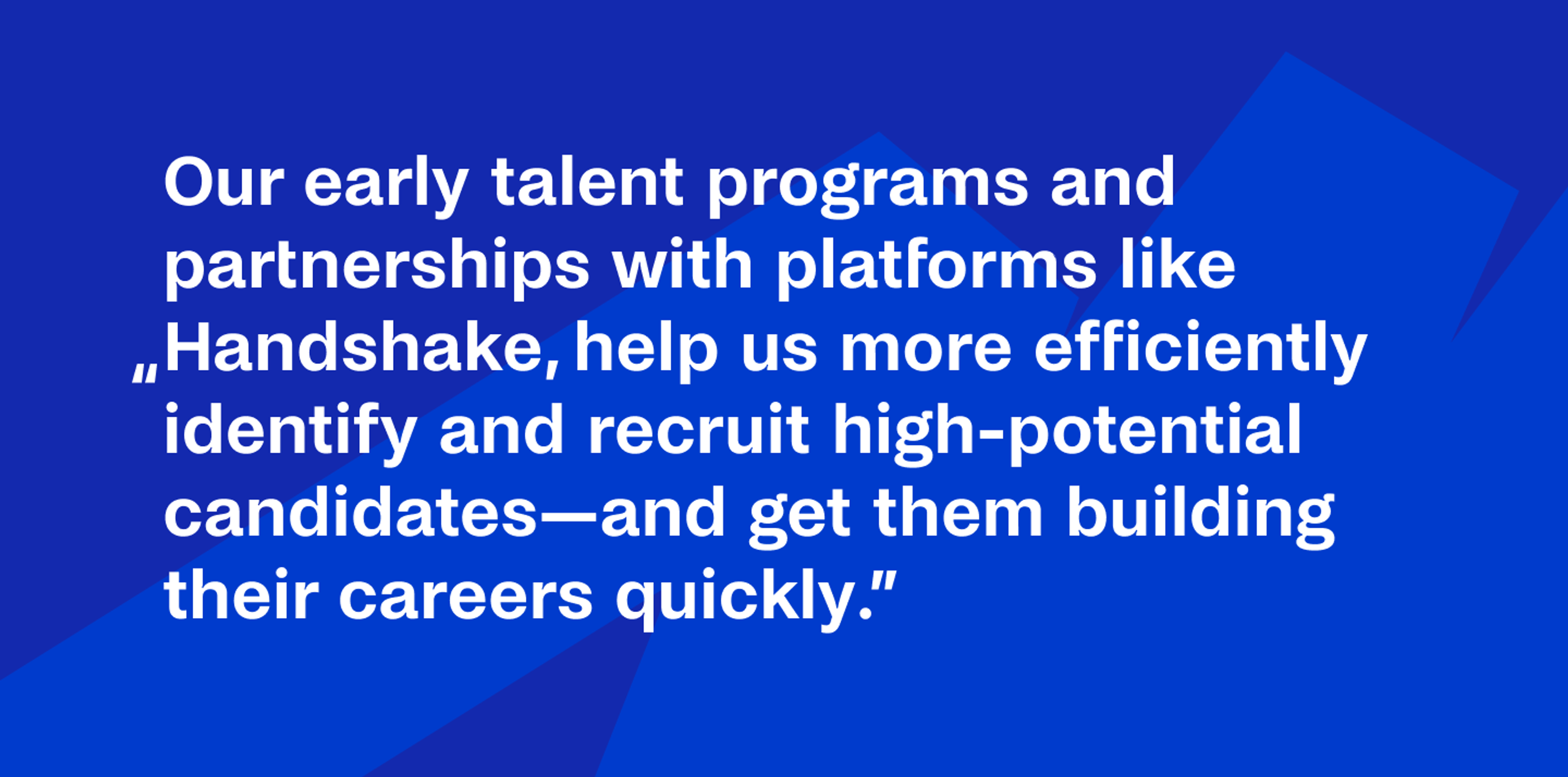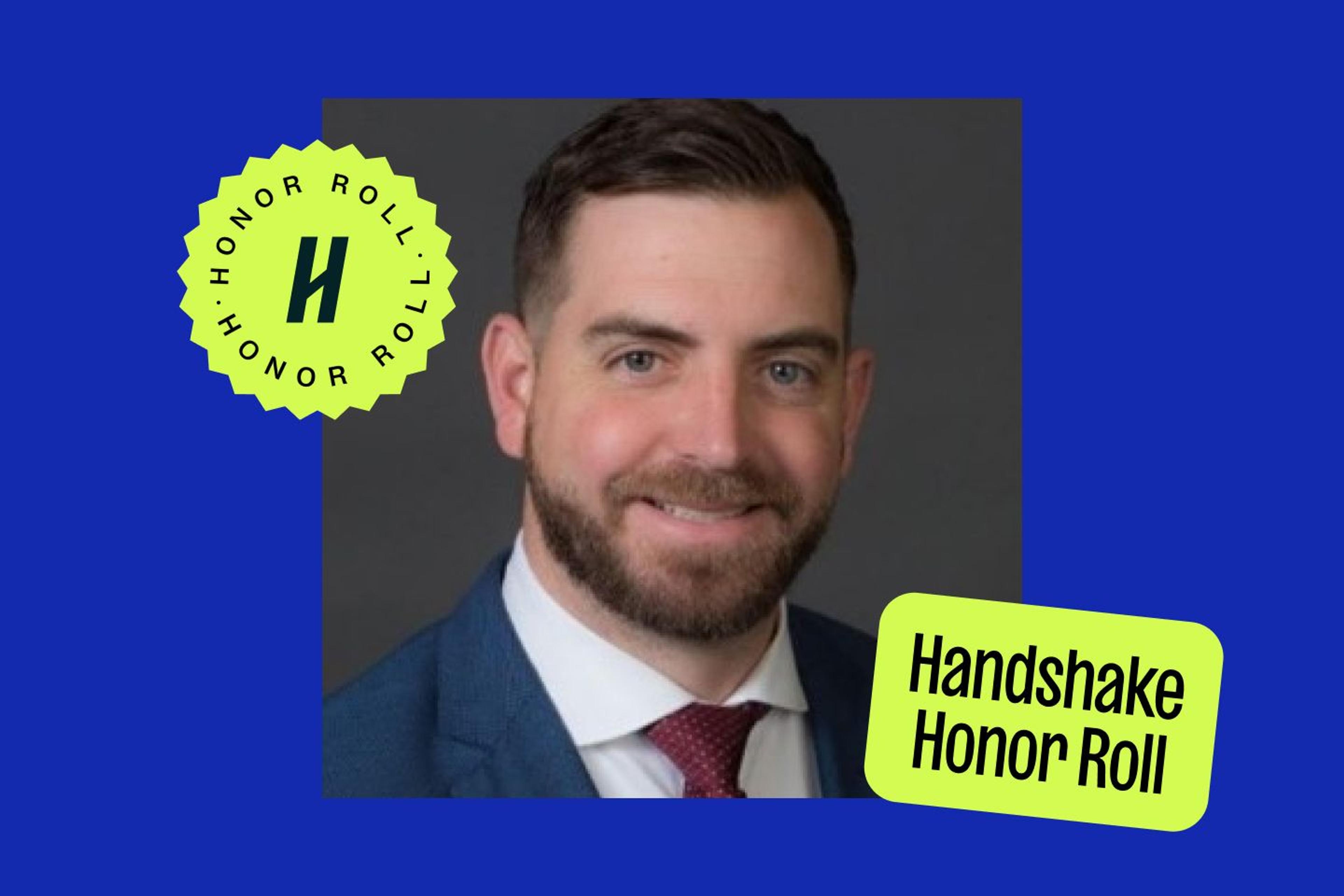Doug McMann’s career journey has spanned over a decade with Kiewit. Starting in an entry-level HR position, he's taken on more responsibilities over the years, which has helped him refine his expertise in talent acquisition and strategic planning—all to help Kiewit find and secure outstanding talent. Today, as HR Director at Kiewit, he leads the Talent Acquisition and Compensation teams.
When asked about his leadership style, he noted one book, in particular, that significantly influenced him, "Good to Great" by Jim Collins. Doug says, “This book really makes clear the importance of humility, discipline, and continuous learning and the value of creating exciting, collaborative work environments that keep teams focused and people engaged on the job. At Kiewit, we work hard to deliver on those things for anyone joining the company.”
Read our Honor Roll interview with him to learn more about what he and his team are doing to help develop a strong workforce foundation and talent pipeline for Kiewit.
Kiewit is one of North America’s largest and most respected construction and engineering organizations. So what are the industry's biggest challenges and opportunities on the horizon?
Others can likely speak better about key industry trends and opportunities that are developing, but one thing is clear: The industry is growing, if not booming. This is a great time for talent to come into the construction and engineering space, whether it’s young students out of college or mid-career professionals looking for a change to skilled craft and interested in great project opportunities across North America.
The reality is the industry is facing a shortage of labor due to an aging workforce and a lack of young talent entering the field to meet the growing demands in infrastructure and energy construction. Attracting, training, and retaining skilled professionals is a key challenge. Companies that do that well–on top of providing a work environment and culture that makes people want to stay–are capably handling those challenges. It’s why Kiewit focuses so much attention on recruitment and retention overall.
How does Kiewit's early career program play a role in solving those challenges and seizing these opportunities?
It plays a vital role. By investing in developing young professionals, Kiewit's early career program helps bridge the labor gap, ensuring that the industry has access to a pool of well-trained and motivated individuals who can contribute to solving complex engineering and construction challenges for clients.
Our program also offers practical, on-the-job training that allows participants to apply their academic knowledge to real-world projects. This experience helps them develop essential skills, understand industry trends, and learn how to adapt to emerging technologies.
The early career program prepares participants for leadership roles by providing opportunities to work on diverse projects and develop critical decision-making, communication, and management skills. By growing and guiding future leaders, it helps Kiewit better tackle project challenges and makes the most of business opportunities in front of us.

How does your team use Handshake to help enable positive business outcomes for Kiewit’s early talent programs?
In my experience, hiring talent early in their careers—which has always been a focal point for Kiewit–has been incredibly beneficial. It brings in young talent we can train and grow, but also mixes in new perspectives and a lot of energy and enthusiasm into the company.
We take a lot of pride in giving people great opportunities early in their career so that they continue to grow and get different experiences—and, ideally, stay a long time at the company.
Our early talent programs, like Kiewit's early career program, and partnerships with platforms like Handshake, have helped us more efficiently identify and recruit high-potential candidates—and get them building their careers quickly inside the company. Our early talent programs also help us reach a broader pool of candidates to not only further diversify our workforce but attract people we may not have easily found otherwise.

As an experienced leader, what other ways have you found to help your team be more successful?
I’ve been fortunate to work with and lead great teams during my time at Kiewit. That’s made things so much easier. For the teams I lead now, I work hard to communicate openly and transparently so team members are always informed about company goals, project expectations and their individual responsibilities. It sounds simple, but making the effort helps keep the team aligned and engaged.
Because I’ve been the beneficiary of great training and see the value of the massive training and development investment that Kiewit makes each year, I strongly encourage and support continuous learning and skill development for team members. Those can come from inside the company, but also externally to hear from others who may be doing some innovative things we can tap or learn from.
Last, but perhaps most importantly, I make it a point to recognize and celebrate the achievements of team members. Providing constructive feedback and celebrating successes only helps people understand what they’re doing well – and where they need to improve. I expect the same type of constructive feedback from my team and ask for it regularly. If we’re not recognizing the good and addressing the times when we don’t meet expectations, then we’re not following how Kiewit has always operated. Our modern-day founder, Peter Kiewit, always said we can “be pleased but not satisfied.” Across Kiewit, we maintain that mindset, from across our design and project operations, to our shared services like HR and Talent Attraction. Celebrate the wins but acknowledge and learn from the missteps.
What advice would you offer executives or leaders looking to improve their brand with in-demand talent, early talent, or Gen Z?
To improve their organization’s brand to attract in-demand younger talent, leaders should consider the following, which we work hard to do at Kiewit:
- Emphasize purpose and values. Younger generations are increasingly drawn to organizations that prioritize purpose and values. Clearly communicate your company's values and show how they are integrated into daily operations and decision-making.
- Highlight and clearly share growth opportunities: Early career professionals and Gen Z talent are eager to develop their skills and advance in their careers quickly. Highlight opportunities for growth, learning and development, including training programs, mentorship and career advancement paths.
- While all companies are different, demonstrate your commitment to creating an inclusive work environment that values diverse perspectives, experiences, and backgrounds. Share your diversity and inclusion efforts and show how people fit into the greater company.
- Showcase your company's cutting-edge technologies and your commitment to innovation to improve processes, products, and services.
And finally, for students looking to enter the construction industry, what advice would you offer them?
Everyone’s path is different, but generally speaking, I’d focus on building a strong foundation in engineering principles, math, and science. These subjects are very helpful in understanding and solving problems in the engineering and construction field.
Also, look for any and every opportunity to participate in internships, co-op programs or work on real-world projects to apply your “classroom” knowledge – whether that’s from high school, college, or technical schools – to practical situations. This experience will help you develop essential skills and make you more attractive to potential employers.
I’d also make sure you’re staying one top of the latest advancements in technology, best practices, and regulations relevant to your chosen field. Attend conferences, join professional associations, and follow industry news to stay updated.
While technical skills are crucial, people who advance and succeed in the industry work hard to develop strong communication and teamwork skills. Engineers and construction professionals often work in teams and need to communicate effectively with colleagues, clients and other stakeholders. Develop your interpersonal skills, presentation abilities and written communication skills even if it’s not something you “love” doing.
And, last, make sure you network as much as possible. Try to make connections with professionals in the industry through networking events, social media and professional organizations. Networking can help you learn more about the field, identify job opportunities, and develop relationships that can benefit your career.
